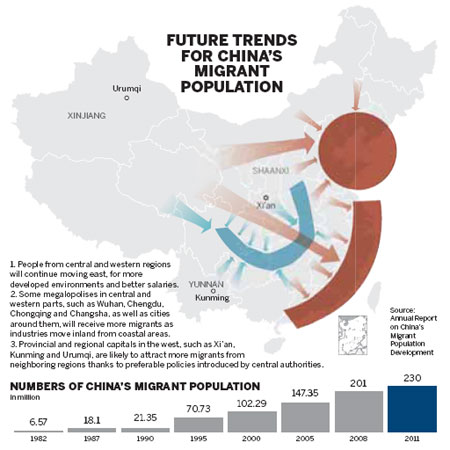Migrant children have greater chance of missing out on school
Updated: 2012-08-08 08:11
By Chen Xin (China Daily)
|
||||||||

The percentage of children of young migrant parents in Beijing, Shanghai and Guangzhou who do not attend school is higher than the national average, according to a report on migrants under age 35 released by the National Population and Family Planning Commission.
The commission looked at the lives of the "floating population" - migrants who do not acquire permanent resident permits, or hukou, in their new cities - of people younger than 35.
It found that more than 60 percent of these migrants in Beijing, Shanghai and Guangzhou brought their children with them.
In Beijing, 82 percent of those children ages 7 to 13 go to public schools, and in Guangzhou, 56 percent, according to the report.
However, 3.5 percent of those children in Beijing do not attend school; in Shanghai, 5.1 percent and in Guangzhou, 5.3 percent.
Nationwide, only 2 percent of the school-age children of the young floating population do not go to school, the report said.
Zhang Yi, a demographics expert at the Chinese Academy of Social Sciences, said around 75 percent of the floating population in big cities are migrants who leave rural areas to find manual jobs in cities.
Zhang said most floating population children who do not go to school are from migrant laborer families, who usually live on the outskirts of big cities, where education resources are limited.
"Migrant workers often change jobs and place of residence, and this would easily cause delays in their children's schooling," he said. "Some schools charge additional fees for the children of migrant families, which are beyond the families' means. This contributes to these children's comparatively high rate of non-enrollment in schools in big cities."
Although some private schools are established in city outskirts for migrant children, Zhang said, some of these have been demolished to make way for urban renewal projects, because most of these schools are set up in deserted factories.
Zhang suggested the government think twice before demolishing such schools because this is likely to increase the number of children dropping out of school.
Feng Xiliang, a labor expert at the Capital University of Economics and Business in Beijing, suggested allocating more education resources to city outskirts to close the gap between those and downtown areas.
"The government should consider basing the allocation of public resources on each region's population instead of the number of hukou-holders," Zhang suggested.
The report also said that in Beijing, the average per capita income of the young floating population is 3,280 yuan ($515) a month; in Shanghai, it's 3,000 yuan and in Guangzhou, 2,470 yuan. The national average is about 2,500 yuan.
Those who hold a bachelor's or higher academic degree earn 5,650 yuan a month in Beijing; 5,760 yuan in Shanghai and 6,570 yuan in Guangzhou. The national average is 4,600 yuan.
In those three cities, the proportion of the young floating population working in high-income and knowledge- or technology-intensive sectors such as finance, real estate, scientific research, education and health are much higher than the national level, said the report.
In those cities, they are more likely to find jobs via the Internet, it said, while elsewhere, they generally seek help from their families, relatives and friends, it said.
chenxin1@chinadaily.com.cn
(China Daily 08/08/2012 page3)

 Relief reaches isolated village
Relief reaches isolated village
 Rainfall poses new threats to quake-hit region
Rainfall poses new threats to quake-hit region
 Funerals begin for Boston bombing victims
Funerals begin for Boston bombing victims
 Quake takeaway from China's Air Force
Quake takeaway from China's Air Force
 Obama celebrates young inventors at science fair
Obama celebrates young inventors at science fair
 Earth Day marked around the world
Earth Day marked around the world
 Volunteer team helping students find sense of normalcy
Volunteer team helping students find sense of normalcy
 Ethnic groups quick to join rescue efforts
Ethnic groups quick to join rescue efforts
Most Viewed
Editor's Picks

|

|

|

|

|

|
Today's Top News
Health new priority for quake zone
Xi meets US top military officer
Japan's boats driven out of Diaoyu
China mulls online shopping legislation
Bird flu death toll rises to 22
Putin appoints new ambassador to China
Japanese ships blocked from Diaoyu Islands
Inspired by Guan, more Chinese pick up golf
US Weekly

|

|







